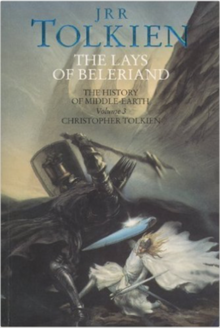The Lays of Beleriand
 Front cover titled "Fingolfin's Challenge" by John Howe | |
| Editor | Christopher Tolkien |
|---|---|
| Author | J. R. R. Tolkien |
| Country | United Kingdom |
| Language | English |
| Series | The History of Middle-earth |
| Subject | Tolkien's legendarium |
| Genre | High fantasy Literary analysis poetry |
| Publisher | George Allen & Unwin (UK) |
Publication date | 1985 |
| Media type | Print (hardback & paperback) |
| Pages | 400 (paperback) |
| ISBN | 978-0261102262 |
| Preceded by | The Book of Lost Tales |
| Followed by | The Shaping of Middle-earth |
The Lays of Beleriand, published in 1985, is the third volume of Christopher Tolkien's 12-volume book series, The History of Middle-earth, in which he analyzes the unpublished manuscripts of his father J. R. R. Tolkien.[1]
Contents[]
The book contains the long heroic lays or lyric poetry Tolkien wrote: these are The Lay of the Children of Húrin about the saga of Túrin Turambar, and The Lay of Leithian (also called Release from Bondage) about Beren and Lúthien. Although Tolkien abandoned them before their respective ends, they are both long enough to occupy many stanzas, each of which can last for over ten pages. The first poem is in alliterative verse, and the second is in rhyming couplets. Both exist in two versions.
In addition to these two poems, the book also gives three short, soon-abandoned alliterative poems, which are The Flight of the Noldoli from Valinor, The Lay of Eärendel, and The Lay of the Fall of Gondolin.
The first versions of the long lays fit chronologically in with Tolkien's earliest writings, as recounted in The Book of Lost Tales, but the later version of The Lay of Leithian is contemporary with the writing of The Lord of the Rings.
The book is split into these main sections:
- The Lay of the Children of Húrin
- First version
- Second version
- Poems Early Abandoned:
- The Flight of the Noldoli
- Fragment of an alliterative Lay of Earendel
- The Lay of the Fall of Gondolin
- The Lay of Leithian:
- The Gest of Beren son of Barahir and Lúthien the Fay called Tinúviel the Nightingale or the Lay of Leithian - Release from Bondage (split into fourteen cantos)
- Unwritten cantos
- Appendix: Commentary by C. S. Lewis
- The Lay of Leithian Recommenced
In the book Christopher Tolkien also mentions a third Túrin poem, this time in rhyming couplets and incomplete called The Children of Húrin and is only 170 lines long (compared to the 2276 lines of the first of the alliterative poems); this poem, however, has been omitted from the book.[2]
Inscription[]
There is an inscription in the Fëanorian characters (Tengwar, an alphabet Tolkien has devised for High-Elves) in the first pages of every History of Middle-earth volume, written by Christopher Tolkien and describing the contents of the book.
The inscription in Book III reads:
In the first part of this Book is given the Lay of the Children of Húrin by John Ronald Reuel Tolkien, in which is set forth in part the Tale of Túrin. In the second part is the Lay of Leithian, which is the Gest of Beren and Lúthien as far as the encounter of Beren with Carcharoth at the gate of Angband
— The Lays of Beleriand, The History of Middle-earth Book III
Reception[]
David Langford reviewed The Lays of Beleriand for White Dwarf #70, stating that "A few gleams of humour come from C S Lewis' 15-page critique of an early draft: for the rest, poor old Tolkien lies entombed and fossilized in earnest commentary, like a set text for Eng Lit."[3]
See also[]
- Beren and Lúthien
- Narn i Chîn Húrin
- The Children of Húrin
- The Silmarillion
References[]
- ^ Whittingham, Elizabeth A. (2017). The Evolution of Tolkien's Mythology: A Study of the History of Middle-earth. McFarland. ISBN 978-1-4766-1174-7.
- ^ Tolkien, J. R. R. (1985). Tolkien, Christopher (ed.). The Lays of Beleriand. HarperCollins. p. 130. ISBN 0-261-10226-5.
there exists a poem in rhyming couplets entitled The Children of Húrin. This extends only to 170 lines [...] and I do not give it here.
- ^ Langford, David (October 1985). "Critical Mass". White Dwarf. Games Workshop (70): 16. ISSN 0265-8712.
External links[]
- Review by Suzanna Rowntree, a fantasy novelist
- "The Adapted Text: The Lost Poetry of Beleriand" by Gergely Nagy in Tolkien Studies
- Middle-earth books
- The History of Middle-earth
- 1985 short story collections
- Fantasy books by series
- Unfinished books
- Middle-earth poetry
- Allen & Unwin books
- Books published posthumously